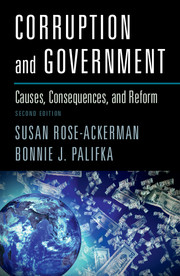Book contents
- Frontmatter
- Dedication
- Contents
- List of Figures
- List of Tables
- List of Boxes
- List of Acronyms
- Preface to the First Edition (1999)
- Preface to the Second Edition
- Acknowledgments
- INTRODUCTION
- PART I CORRUPTION AS AN ECONOMIC PROBLEM
- 2 Bureaucratic Corruption
- 3 Corruption in Procurement and Privatization
- 4 Reducing Incentives and Increasing Costs
- 5 Civil Service Reform and Bureaucratic Reorganization
- 6 Using the Criminal Law to Deter Bribery and Extortion
- PART II CORRUPTION AS A CULTURAL PROBLEM
- PART III CORRUPTION AS A POLITICAL PROBLEM
- PART IV REFORM AGENDAS: DOMESTIC POLITICAL WILL AND INTERNATIONAL INFLUENCE
- CONCLUSIONS
- References
- Index
2 - Bureaucratic Corruption
from PART I - CORRUPTION AS AN ECONOMIC PROBLEM
Published online by Cambridge University Press: 05 March 2016
- Frontmatter
- Dedication
- Contents
- List of Figures
- List of Tables
- List of Boxes
- List of Acronyms
- Preface to the First Edition (1999)
- Preface to the Second Edition
- Acknowledgments
- INTRODUCTION
- PART I CORRUPTION AS AN ECONOMIC PROBLEM
- 2 Bureaucratic Corruption
- 3 Corruption in Procurement and Privatization
- 4 Reducing Incentives and Increasing Costs
- 5 Civil Service Reform and Bureaucratic Reorganization
- 6 Using the Criminal Law to Deter Bribery and Extortion
- PART II CORRUPTION AS A CULTURAL PROBLEM
- PART III CORRUPTION AS A POLITICAL PROBLEM
- PART IV REFORM AGENDAS: DOMESTIC POLITICAL WILL AND INTERNATIONAL INFLUENCE
- CONCLUSIONS
- References
- Index
Summary
All states, whether benevolent or repressive, control the distribution of valuable benefits and the imposition of onerous costs. The distribution of these benefits and costs is generally under the control of public officials who possess discretionary power. Private individuals and firms who want favorable treatment may be willing to pay to obtain it. Payments are corrupt if they are illegally made to public agents with the goal of obtaining a benefit or avoiding a cost. Many payoffs are made in return for actions that violate the rules. However, individuals or firms also pay bribes to get benefits to which they are entitled or to avoid costs artificially created for the purpose of generating bribes. These payoffs are corrupt as well. Some languages have distinct words for these different situations. Thus, Bardhan (1997: 1323) notes the difference in Russian “between mzdoimstvo, taking a remuneration to do what you are supposed to do anyway, and likhoimstvo, taking a remuneration for what you are not supposed to do.”
Corruption is a symptom that something has gone wrong in the management of the state. Public institutions govern the interrelationships between the citizen and the state. If corruption is present, such institutions are used, not to further public values, but, instead, for personal enrichment and the provision of benefits to the corrupt. The price mechanism, so often a source of economic efficiency and a contributor to growth, can, in the form of bribery, undermine the legitimacy and effectiveness of government. Poorly designed government institutions cause economies to stagnate and inequalities to persist.
In this portion of the book, we assume that the law has established clear rules that separate legal from illegal behavior – labeling some actions as bribery or extortion – and that everyone understands which acts are corrupt even if they engage in them. Even in this clear-cut world, although some people will never act corruptly on moral grounds, others will choose to be corrupt seemingly by habit, and still others will weigh the costs and benefits of engaging in each corrupt act. As detective Frank Serpico lamented, “Ten percent of the cops in New York City are absolutely corrupt, 10 percent are absolutely honest, and the other 80 percent – they wish they were honest.” Tirole (1996) refers to this last group as “opportunistic”; Beenstock (1979) calls such people “pragmatic.”
- Type
- Chapter
- Information
- Corruption and GovernmentCauses, Consequences, and Reform, pp. 51 - 92Publisher: Cambridge University PressPrint publication year: 2016



